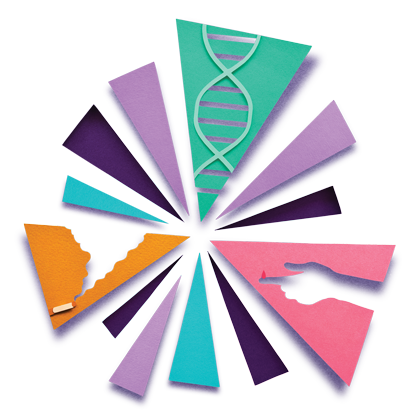Research and Other Highlights from the 2023 AACR Annual Meeting

Scientists across the world are working diligently to unravel the molecular mechanisms that make cancers grow, divide, and spread, to help develop better treatments that can extend life and potentially even cure some of these diseases.
Their efforts were on full display during the 2023 American Academy of Cancer Research (AACR) Annual Meeting. Pancreatic cancer, as we know, is one of the toughest cancers to treat. At this meeting it was clear that science is making headway in turning this lethal malignancy into one that is much more effectively treated.
Let’s Win is bringing you some brief highlights from the AACR meeting. We will be covering some of these topics in greater detail in the coming months.
Beating KRAS
The approval of sotorasib (Lumakras) in 2021 to treat non-small cell lung cancer harboring the KRAS-G12C mutation transformed KRAS from an undruggable mutated, cancer-causing gene to a druggable therapeutic target. The drug approval created an overnight sensation in cancer research and therapy. Targeting KRAS mutations directly set the stage for research into effective treatments for about a quarter of all human cancers, but the excitement obscured a more sobering reality. Sotorasib and subsequent KRAS-targeting agents are the result of decades of painstaking basic and applied cancer research.
Recent advances in immunotherapy and targeted therapy have significantly improved outcomes for many patients. However, these advances resulted in limited progress for those with RAS-mutated tumors, noted Dafna Bar-Sagi, Ph.D., Saul J. Farber Professor of Biochemistry and Molecular Pharmacology, Executive Vice President and Vice Dean for Science at NYU Langone Health, New York City. That scenario has changed dramatically with the emergence of therapeutics that target RAS directly and improvements in immune intervention technologies.
G12C is the most common mutation in RAS-driven tumors and is often seen in lung cancers. There are different RAS allele mutations in pancreatic and other cancers, which are the target of allele-specific inhibitors currently in development. One of the most exciting developments is pan-RAS inhibitors that are agnostic to the allele and target every constitutively active form of RAS. In addition to small molecule inhibitors, researchers are striving to develop other therapies directed at KRAS-mutated tumors, such as adoptive cell therapies and vaccines against mutant forms of the protein.
These approaches represent a new personalized medicine strategy for many solid tumor indications, and having them work for RAS tumors would be a major advance in the field. Indeed, anti-KRAS therapies hold promise for treating some of the deadliest cancers. However, scientists are learning that targeting RAS by itself will probably not be sufficient. This means that it is not the time to rest on our laurels; it remains vital to define why and how tumors become resistant to these therapies and then design novel approaches to overcoming that resistance.
Frank McCormick, Ph.D., F.R.S., of the UCSF Helen Diller Family Comprehensive Cancer Center (San Francisco), added significant information on the history and ongoing efforts in “The Race to Kill RAS.” McCormick highlighted some of the therapeutic approaches that are currently under evaluation to address these goals. He shared encouraging results from an investigational KRAS inhibitor, BBO-8520. Unlike sotorasib and adagrasib, which bind the inactive form of KRAS G12C, this compound targets the active form as well. Due to this feature, McCormick explained, BBO-8520 inhibits RAS more quickly than either sotorasib or adagrasib because it avoids having to wait for RAS to cycle through from an active to an inactive state.
Fellow presenter Pasi Jänne, M.D., Ph.D., of the Dana-Farber Cancer Institute (Boston), is also interested in inhibiting the active form of KRAS. He shared promising preclinical and clinical data illustrating the efficacy of investigational pan-KRAS inhibitors that target the active form of multiple KRAS mutants. He also discussed the potential of combining KRAS inhibitors with additional therapies, including immune checkpoint inhibitors.
Researchers are also exploring harnessing the immune system in various ways to target KRAS-mutated cancers. Beatriz Carreno, Ph.D., of the Perelman School of Medicine at the University of Pennsylvania (Philadelphia), reported that patients who received an investigational vaccine had T-cell responses against neoantigens found on KRAS-mutated cancers.
Additionally, T cells engineered to recognize these neoantigens effectively killed patient-derived cancer cell lines and led to tumor regression in mouse models.
Advancing the Frontiers of Cancer Science and Medicine
Deb Schrag, M.D., M.P.H., Chair of the Department of Medicine at Memorial Sloan Kettering Cancer Center (New York City), discussed the promise and challenges of scaling new cancer screening technologies, including the potential for multi-cancer early detection (MCED) tests to transform cancer screening. MCED tests developed by more than 30 firms are currently in various stages of development and testing. While some early studies are encouraging, Schrag said clinical utility studies are needed to evaluate whether MCED testing reduces cancer-specific mortality—the primary goal of all cancer screening.
David DeNardo, Ph.D., Professor of Medicine in the Oncology Division at Washington University School of Medicine (St. Louis, Missouri), reviewed emerging therapeutic strategies to stimulate anti-cancer immunity, such as modulating the systemic impacts of cancer on the immune system and targeting the tumor microenvironment. While immune-based therapies continue to advance, not all patients benefit from immunotherapies. The challenge will be to identify those patients likely to respond, enhance the durability for patients whose responses are not yet durable, and understand how to leverage the immune system to benefit those patients and cancer types that do not yet respond to immunotherapy.
Teresa A. Zimmers, Ph.D., Professor of Cell, Developmental, and Cancer Biology at Oregon Health & Science University’s Knight Cancer Institute (Portland) described important new insight into the complexity of cachexia and its impact on cancer outcomes. Zimmers said there’s an enormous need to develop proven therapeutic options for cachexia.
Lifetime Achievement Award in Cancer Research
Chimeric antigen receptor (CAR) T cells added the word cure to discussions of cancer treatment. But CAR T cells were never envisioned as therapy. They were more a proof-of-concept experiment that went better than expected, according to Carl H. June, M.D. (Perelman School of Medicine, University of Pennsylvania), recipient of this year’s AACR Award for Lifetime Achievement in Cancer Research. June discussed the unexpected transition from an encouraging breakthrough in mouse models to first-in-modality CAR T cell therapy during his awards lecture on the unlikely development of CAR T cells.
The development of CAR T cell therapy to treat blood cancers has also upended the traditional drug development paradigm of focusing on agents to treat relatively common diseases. Conventional approaches do not incentivize the industry to develop and treat patients on a one-by-one basis, or even a few thousand at a time. Cellular and gene therapies are more complex to design, produce, deliver, and are more effective, but the ultra-personalized approach makes it possible and practical to treat diseases unique to an individual patient, compelling researchers, industry, regulators, and clinicians to confront rare diseases head-on.
Early Detection
Elana Judith Fertig, Ph.D., of Johns Hopkins Medicine and the Sidney Kimmel Comprehensive Cancer Center (Baltimore, Maryland), discussed a spatial multiomics approach to studying pancreatic cancer development—namely the interactions between neoplastic cells and the microenvironment during pancreatic carcinogenesis.
New single-cell and spatial molecular profiling technologies have enabled unprecedented characterization of the cellular and molecular composition of the microenvironment in advanced pancreatic cancer, which includes a dense composition of cells that are associated with immunosuppression. The convergence of these technologies with machine learning and mathematical modeling provides the potential to identify candidate therapeutics to intercept immunosuppression in pancreatic cancer.
Phillip G. Febbo, M.D., of Illumina, Inc., addressed the complexity of early cancer detection at the societal level and the potential to improve cancer outcomes through equitable access to testing, including emerging multi-cancer early detection tests (MCEDs).
Karriem Watson, D.H.Sc., M.S., M.P.H., Chief Engagement Officer of the All of Us Research Program at the National Institutes of Health, highlighted the importance of community engagement in early cancer detection strategies as a key to improving patient outcomes.
Studies have demonstrated that community engagement can help mitigate cancer health disparities by increasing communities’ knowledge of the importance of healthy behaviors, building trust in research, and improving study design and ethics. Increasing access to and awareness of medical studies with an emphasis on populations that have been historically underrepresented in biomedical research has also been shown to expand the reach of innovative and novel breakthrough therapies for early detection and improve cancer outcomes.
MCEDs can pose a risk, as outlined by other presenters. Despite their tremendous promise, much about MCED tests is still unknown and many unanswered questions remain, such as: What happens if subsequent testing doesn’t find cancer in a person who tested positive on an MCED? Or is their future risk of cancer increased? And is there the potential for MCED tests to exacerbate racial, ethnic, and socioeconomic disparities in cancer outcomes? Those are just a few examples. What is clear, said the presenters, is that the most important question is whether these tests actually reduce deaths from cancer, which is the ultimate goal of cancer screening? More research is necessary to understand how best to maximize their benefits and minimize their potential harms.
Pancreatic Cancer: Informing Future Precision Medicine Trials
Jennifer J. Knox, M.D., University Health Network, Princess Margaret Cancer Centre, Toronto, Ontario, Canada, reviewed recent breakthroughs and failed trials in pancreatic cancer. She found an alarming statistic. Six trials, enrolling 2,600 patients, did not effectively move the needle in the right direction of improved therapeutics.
Scientists are still grappling with the issue of which patients will benefit most from the combination of gemcitabine/nab-paclitaxel versus FOLFIRINOX. But they are making progress. For example, the COMPASS trial found that RNA signatures correlated with response to chemotherapeutic treatment. Knox believes the time has come to design trials with smaller cohorts, stronger hypotheses, and deeper characterization of the tumor itself. For example, the PASS-01 trial involves deep genomic profiling. And there are promising drugs on the horizon such as new PARP inhibitors and drugs targeting KRAS-G12D.
Marina Pasca Di Magliano, Ph.D., Professor of Surgical Immunology, University of Michigan Medical School, Ann Arbor, spoke about using immune profiling to better understand patient heterogeneity, and how researchers are able to find changes in the tumor that are also detectable in the blood.
Novel Immunotherapy Combination Trials
A study on the addition of Salmonella-IL2 to FOLFIRINOX for metastatic stage IV pancreatic cancer found that the combination nearly doubles median survival when compared to historical and site-specific controls receiving FOLFIRNOX only. This strongly indicates that a larger pivotal phase III multicenter trial is warranted. The group behind the study includes Petr Kavan, M.D., Ph.D. and Gerald Batist, M.D., (McGill University, Montreal, Canada), and Daniel A. Saltzman, M.D., Ph.D., Jule Muegge, M.P.H., Jordan Moradian, (Salspera, Cambridge, Massachusetts).
Safety and immunogenicity of a first-in-human mutant KRAS long peptide vaccine combined with ipilimumab/nivolumab in resected pancreatic cancer was also reviewed as well as preliminary data of mutant KRAS vaccine plus immune therapy after surgery in pancreatic adenocarcinoma. Work is ongoing at Johns Hopkins. A presentation about individualized mRNA neoantigen vaccines for pancreatic cancer was also given by Vinod Balachandran, M.D., of Memorial Sloan Kettering Cancer Center.
Honoring Elizabeth Jaffee, M.D.
The AACR honored noted pancreatic cancer researcher Elizabeth M. Jaffee, M.D., Fellow of the AACR Academy and AACR Past President, with the 2023 AACR-Margaret Foti Award for Leadership and Extraordinary Achievements in Cancer Research.
Jaffee has spearheaded innovative research that has resulted in the development and clinical evaluation of several immunotherapies. Notably, she contributed to the testing and development of an allogeneic GVAX cancer vaccine for pancreatic cancer, which delivers pancreatic cancer cells engineered to secrete the immunostimulatory cytokine granulocyte-macrophage colony-stimulating factor (GM-CSF), thereby promoting activation of an antitumor immune response. Jaffee has also explored combinations involving GVAX and the CRS-207 vaccine.
Her research has also focused on exploiting genomic and proteomic technologies to define biomarkers of pancreatic cancer onset and progression. These studies have resulted in the identification of Annexin A2 as a potential regulator of pancreatic cancer metastasis. Jaffee’s ongoing work aims to utilize new and emerging technologies to uncover the complex signaling pathways that exist between tumor cells, monocytes, and stromal cells in pancreatic cancer, and to develop novel methods to bypass these communications to potentiate antitumor immune responses.







